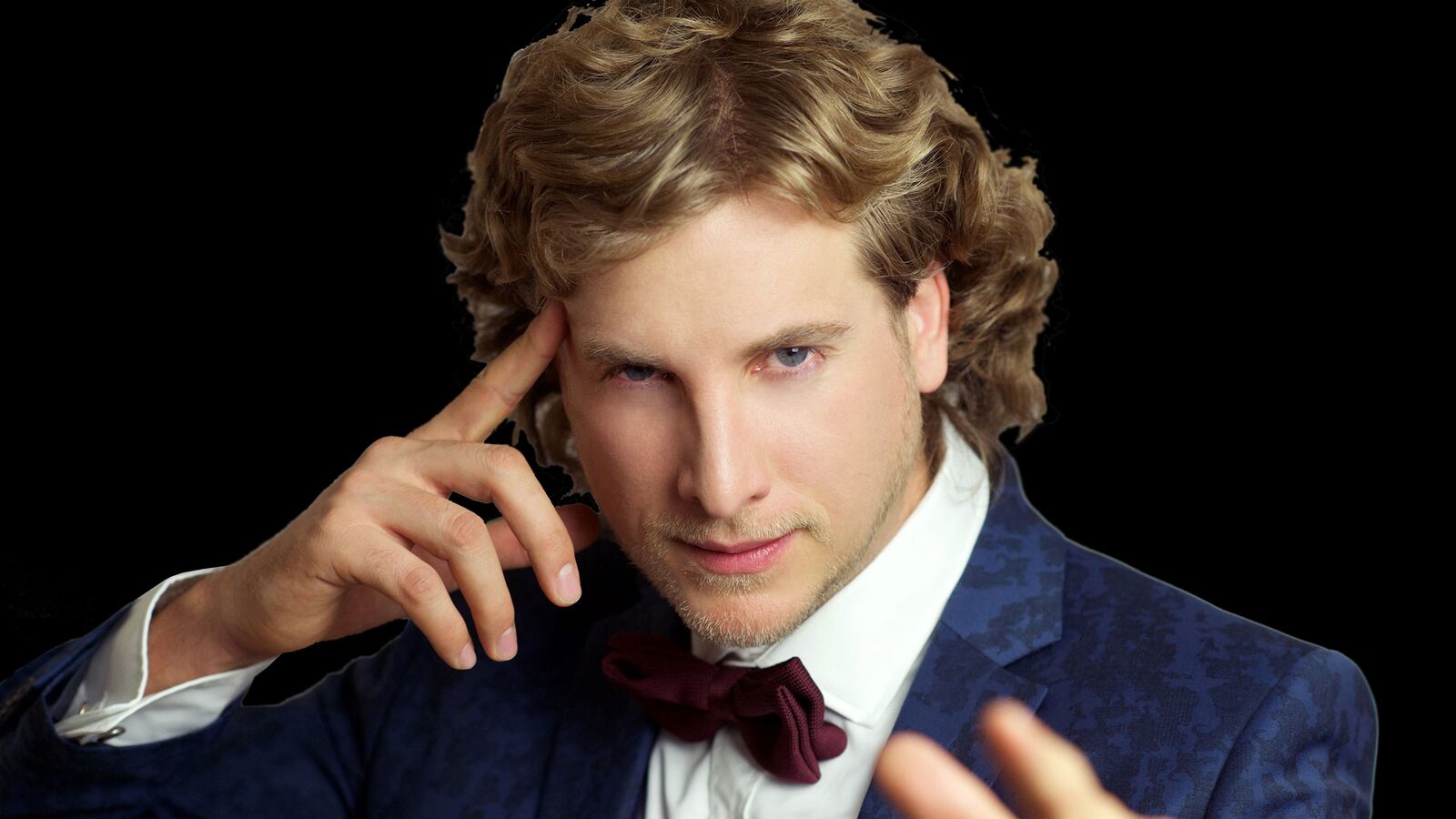Not long ago, I met a man named Matias Letelier at an Equinox gym on the Upper West Side. This particular gym is not the average treadmill-and-weights place, but a bustling luxury complex with a rock climbing wall, an indoor pool, a cryotherapy room, private offices, a “clean eating” cafe, and a swarm of Lululemon-clad clientele whose six-figure salaries radiate off them in extremely well-toned waves. This is where CEOs, consultants, gallerists, bankers, and tech bros break a quick sweat before cutting deals in the communal lounge. It has, in short, a very corporate vibe and Matias Letelier does not vary much from that norm. He uses the gym like his office, working out for hours between phone calls, emails, and meetings.
On this particular afternoon, the only thing about Letelier that deviated from the Equinox crowd was his custom-made Under Armour. He wore a matching outfit of black, sweat-licking fabric covered in a silver playing-cards print. His shirt read: “Got Magic?”
Letelier is a “corporate magician.” That’s not advertising jargon for someone who works wonders with large companies or something—it’s an actual job, and a much more common one than anyone outside the world of magic might think. Almost any professional magician at a bar mitzvah, birthday, cabaret, or casino does “corporate work.” This is not only true of minor neighborhood acts, but also of magic’s major-leaguers. Even performers like Jen Kramer—a successful magician by almost every metric, with a regular show in Las Vegas, a credit on Penn & Teller’s Fool Us, a Merlin Award (the magic community’s Oscar), and the 2016 title of Female Magician of the Year from the International Society of Magicians—makes time for gigs with the megacorps.
Corporate jobs are, bizarrely, the key to paying your bills as a magician, and they can be, despite pretty much every assumption ever made about magicians, very lucrative. I’ve talked to mid-level magicians who rake in around $4,000 per event, depending on the size and setting, and established acts who regularly charge between $8,000 and $10,000 for a night of tricks at companies like AT&T, American Express, Time Warner Cable, Cisco, Airbnb, LA Fitness, Capital One, IBM, Disney, Home Depot, CNN, Cole Haan, Heineken, the Boston Red Sox, and Veuve Clicquot. When you’re booking between 100 and 300 shows a year—as many pro-magicians do—that adds up.

Take, as just one example, Max Lukian, a junior at Yale University, president of the Yale Magic Society, and part-time performer, who books about 40 corporate shows a year and plans to go full time when he graduates. The 20-year-old math major, who rushed Sig Nu, joined Sig Ep, and could easily do consulting, is no bohemian (or chronically underpaid millennial, for that matter), scraping his way through the gig economy. Corporate magic is not particularly precarious.
“If I were only interested in getting money,” Lukian told The Daily Beast, “I would become a corporate magician and drop out of Yale right now. That’s no question for me.”
On a couch at the Equinox cafe, Letelier whipped out his computer and opened up a 53-slide PowerPoint about his entire career. A tall, slim guy with a head of blonde curls, Letelier has more than a dozen of these PowerPoints, each with a different focus. Some emphasize his corporate presentations. Some talk about trade shows or brand partnerships or team building exercises. All of them include portions on his life story, his history of philanthropy (which includes support for the Eric Trump Foundation), and the origins of his business: “Fun Corporate Magic.”
As the slides tell it, Letelier grew up in Chile among a tight-knit family which “had everything,” including a large library of magic books. When an uncle died and left him the collection, Letelier read up in earnest. He started performing amateur shows while studying business at Pontifical Catholic University, an elite school in Santiago, under the stage name “Magician Matias.” In 2010, when the 30-something married his American girlfriend and emigrated with her to the United States, he combined his two interests into a company which, as the merchandise puts it, “fuses business with magic.”
Fun Corporate Magic, which Expertise.com ranked among New York’s top corporate magic firms in 2017, consists of Letelier and his assistant, who goes only by her first name, Coni. Coni’s responsibilities range from sending emails (always signed “Magically yours”) to finagling the paperwork of Letelier’s legion of corporate clients (taken together, they amount to a kind of roll call of major American companies) to occasionally getting cut in half. But for the most part, Letelier runs a one-man operation, performing a range of tricks which at first glance, might not look so different from a standard Saturday night variety show.
Like most magicians, Letelier does sleight-of-hand tricks, levitates tables and reads minds. He can pluck names and numbers from the imaginations of his audience or pickpocket a whole room, only to find one woman’s wallet in the C.E.O.’s drink. In some respects, corporate magic, which ranges from informational magic, motivational magic, marketing magic, trade show magic, promotional magic, and team-building magic—to name only a few—is not unlike normal magic. But every shade of corporate magic entails what its practitioners call “magic with a message:” a nicer way of stating the obvious—that corporate magic is doing more than duping you, it’s trying to sell you something.
So in Letelier’s act, the standard tricks come with a sales pitch. He makes a ball disappear but he finds it again, animated, on the home screen of an iPad. He transforms a fistful of dollar bills into five crisp hundreds, then ushers the audience off to a free insurance consultation with a $500 value. He reads minds and sees the numbers 1-7-7-2: the same year Veuve Clicquot, one of his main sponsors, was founded.
In one of his PowerPoint slides, Letelier includes a picture of one of his best corporate tricks. It’s at a trade show in 2014, for the toothpaste company Premier. They were unveiling a new whitening component called “amorphous calcium phosphate,” or ACP, and Letelier had designed a trick that made stains disappear from two large, fake molars. In the photos, Letelier is surrounded by a group of business casual ladies, all laughing. It looks real, like they are actually amazed.
“I want people to laugh,” Letelier explained, “because when people laugh, they lower their defenses. And that makes me deliver all the key points, the key benefits, [of the product]. When you are having fun, you are more receptive. When you are bored or when you are tired, you shut down, and I don’t want that. I want you to open up.”






